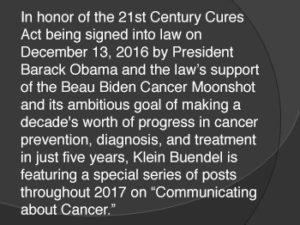Learning to Communicate about Cancer
“Communication” is an all-too-common term in society. We talk about needing better communication at work or about how easy talking with a certain friend is, but what does it really mean to communicate? And is it possible to become a better communicator? The short answer is “yes.” We can always become better communicators. We can start by learning more about communication and by practicing some essential skills.
Communication is a process. It is composed of different aspects working together. Each aspect plays a vital role in the communication process and can alter the overall message that we are trying to impart. Keep these aspects in mind to better understand the basics of communication and your role in the process.
- Verbal messages are the words chosen or spoken. Another way to think of verbal messages is that they are communication through language.
- Nonverbal messages include posture, facial expression, eye contact, tone, and gestures. Though nonverbal messages do not include words, they can be very descriptive by themselves or can augment verbal messages.
- Active listening involves not only hearing but being all-present during the conversation. Many times we can be distracted by noise or even by daydreaming.
- Communication also involves feedback. Feedback and be verbal or nonverbal messages that tell the speaker that his or her message has been received.
Communication is a skill. Often good communication is thought to be second nature, something that comes naturally to all of us. After all, we know how to speak to each other, right? Actually, effectively communicating can be tricky for each of us at one point or another. One case in point is when we are talking about cancer — as a patient, with a patient, with a healthcare provider, as a healthcare provider, and so on. Cancer touches so many people that nearly all of us will talk to someone about cancer at some point in our lives. It is possible to learn to communicate well or better, even in response to a cancer diagnosis. We can improve our communication by developing our abilities to:
- foster trust
- show and gain respect
- disclose information appropriately
- display emotions appropriately
- empathize with others
- manage conflict
We may be good at one or more, but not masters of all abilities related to rewarding communication. Work through the articles and activities on the Patient Talk pages to improve or refine your cancer communication skills. Because every cancer experience is different, the articles and activities are designed to be stimulating in ways that spark self-reflection and recognition of varying communication patterns in yourself and others.
Good communication can strengthen interpersonal relationships, enhance overall well-being, and help smooth out the bumps in the road on a cancer journey.

This research project was funded by a grant from the National Cancer Institute (CA144235; Dr. Wayne Beach, San Diego State University, Principal Investigator). Co-investigators included Dr. David Dozier from San Diego State University, and Mary Buller, Dr. Valerie Myers, and Dr. David Buller from Klein Buendel, Inc.